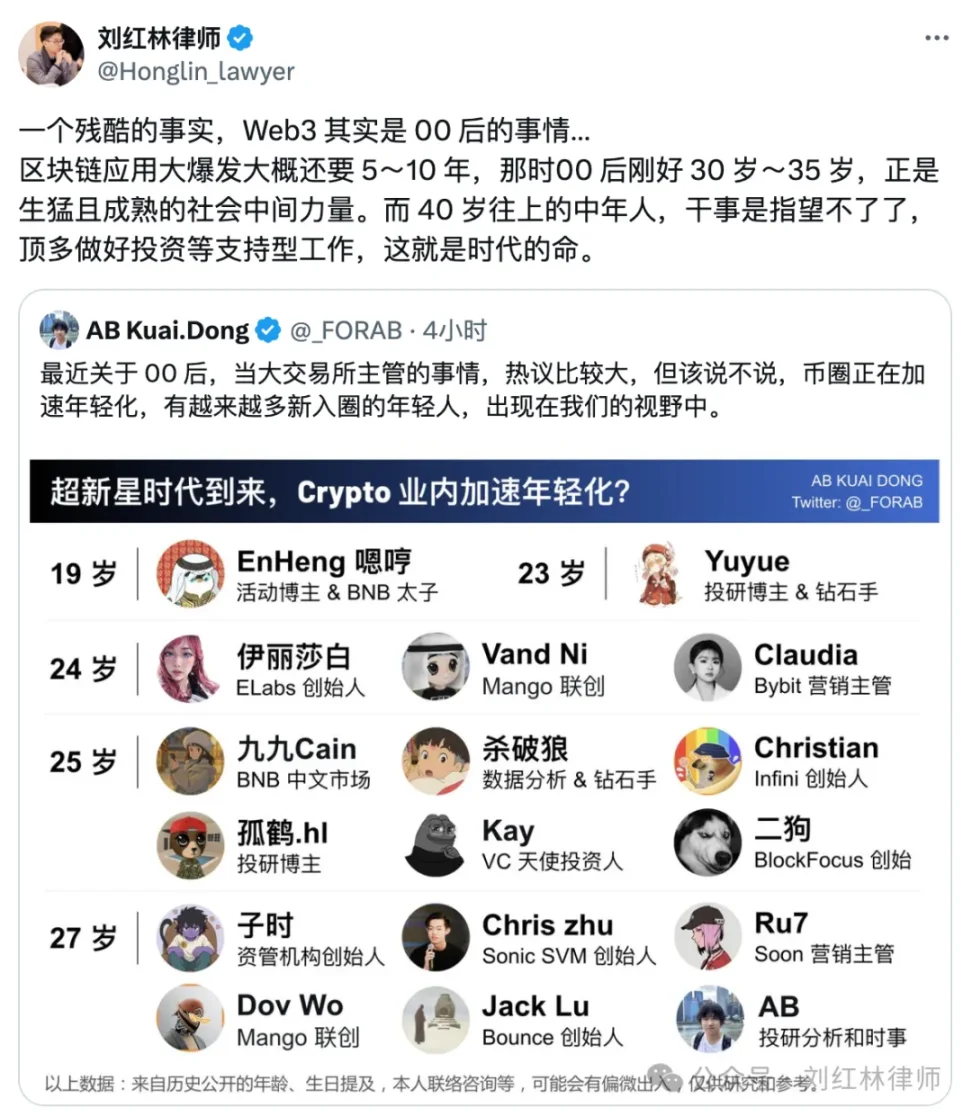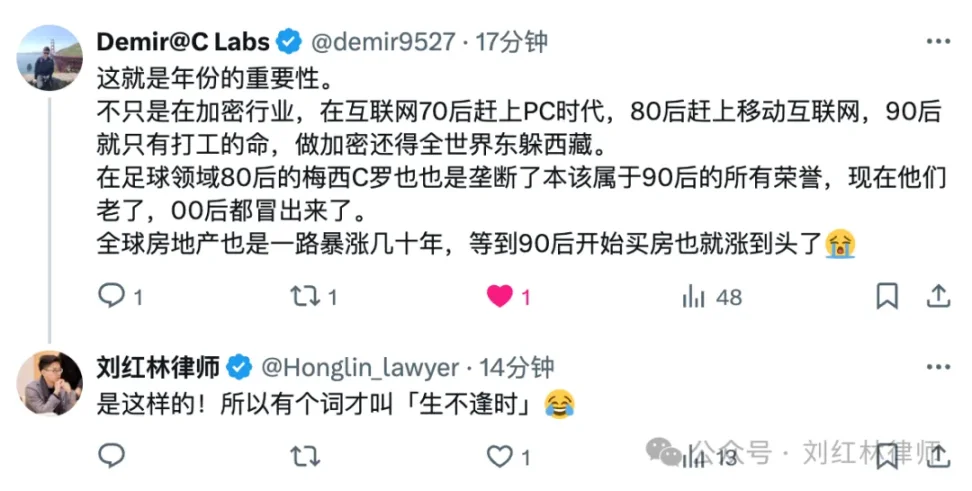In the crypto industry, "young" is no longer a label, but a reality.
Lawyer Hong Lin, while surfing the internet, saw a "Young Faces of Crypto Industry" list circulating on social media. From BNB, SVM to Infini, from researchers to VCs, from exchange operations to MEME community founders, all were young people in their twenties. The youngest was 19, and the oldest not more than 27. They are not just project representatives, but also narrative leaders, community organizers, and even capital dispatchers.
Lawyer Hong Lin couldn't help but sigh: "A cruel fact is that Web3 is actually a matter for the post-00s generation..."

Why did the "young people" win this race?
This is not an emotional lament, but a calm and serious time progression. According to the current industry's (especially Ethereum stablecoin projects) development progress, if the blockchain industry truly wants to usher in an application explosion, it will optimistically take 5-10 years - by then, the post-00s will be 30-35 years old, precisely at the golden age of being both technically and resourcefully robust and mature. What about the 80s and 90s generations? Most of them have passed their prime fighting stage, both physically and mentally. If they still want to do something in the industry without admitting defeat, they will most likely have to transition to investors or contribute workplace skills based on years of experience, with fewer opportunities to charge forward.
The reason is that today's Web3 is no longer an industry won by experience, but by discourse power, community perception, and information sensitivity. And these often do not lie in the hands of the older generation.
Those young people on the list almost lack labels of "traditional finance" or "internet giants" backgrounds. You can interpret this as lacking social experience, but it can also be said that they have no path dependence or toxic existing assets. They are not transitioning from Web2 to Web3, but are directly "born on the chain". For this generation, Web3 is not a transition, but their primary occupation.
They started investing in projects, becoming KOLs, and building communities from university clubs, understanding the on-chain game rules, marketing techniques, data rhythms, and ecosystem linkages far beyond the "old drivers". They have no baggage, come with their own discourse system, dare to speak and try, and even enjoy charging forward and stepping on landmines. This generation's technical capabilities and market intuition are truly native "chain species".
More importantly, they have formed a new trust system and collaboration method. Not through "master-apprentice system" or "platform transfusion", but through friend circles, Telegram groups, RedBook dynamics, and constantly changing MEME culture. This collaboration method is difficult for older generations to integrate into, and they might not even understand it.
Old Web3 Practitioners: The Passive "Overtime" Destiny
If you are a Web3 practitioner from the 80s or 90s, you might already be a bit tired these years: bull markets wave after wave, technical narratives shifting from Layer1 to RWA, then to AI+Crypto, this pace is somewhat breathtaking.
You might have done many "structurally correct" things, like launching chains, making wallets, managing guilds, and funds, but looking back, what truly won the market was a 23-year-old graduate student's airdrop bot, token intelligence analysis, and diamond hands community, all done while attending classes.
You are not lacking effort, but the rhythm is off. For today's Web3 world, speed trumps scale, traffic trumps foundation, and rhetoric trumps experience. This is not a matter of right or wrong, but of changed rules.
Crypto's technical development is becoming increasingly modular and productized, reducing dependence on "elite developers"; while the complexity around community, traffic, and token economic design is rising. Narratives are becoming faster, heat shorter, project lifecycles compressed, and the importance of operations and gaming strategies is increasing.
This means the industry's requirements for people have changed. From "being able to do" to "being able to express"; from "technical" to "reactive"; from "accumulating assets" to "creating emotions".
In such an environment, the advantage of being young is not "cheap", but that they have a shorter feedback cycle, fewer path dependencies, and more flexible social operation methods. Their "first principle" is social network, not white papers.
This is not the alienation of Web3, but its original form: an experimental industry that puts community drive and consensus building first.
The biggest challenge for middle-aged people is not lack of ability, but "high participation cost". Unable to stay up late on Discord anytime, unable to organize ecosystem activities three times a week, and unable to turn social accounts into life extensions. At this point, you can only retreat to the second line, do angel investing, conduct research, and share industry knowledge. This is the real meaning behind Lawyer Hong Lin's words about "at most doing good investment support work".

Web3 Old OGs, How to Pass the Baton?
In 1961, 26-year-old Li Ao wrote "The Elderly and the Baton" in Taipei, sharply questioning the predecessors of the intellectual circle who "neither retire nor bring disciples, unwilling to hand over the baton".
He said: "What young people fear most is not that you don't give them the baton, but that you hold an outdated baton and then hit them on the head." This sentence, spanning sixty years, still seems like a precise call-out to many "old leeks" and "industry elders" in the Web3 world.
His generation wrote about batons in terms of academic, political, and cultural generational anxiety. Today, when we talk about the "Crypto baton", we mean the real transfer of technical discourse power, traffic organization, and community control. The baton is no longer an abstract "ideal" or "tradition", but concrete nodes, Tokens, and industry circle influence.
Li Ao reminded the younger generation not to overestimate the older generation's "inheritance desire" - many haven't even held the baton firmly, and what many hand over is just a hollow baton emptied by time, with only a coating left.
They claim to support young people, but when it comes to resource allocation, project launch, and voting decisions, you'll find that "support" is just a posture, and power remains in their own pockets. "You propose, I approve; you operate, I sign; you charge forward, I '+1' in the group." The result is that you think you're relaying, but you're actually just working.
So the problem has never been about being old or young, but whether you truly have the consciousness and ability to "hand over the baton".
Don't forget, with every technological innovation, there will be a group of "behind-the-scenes operators". They don't steal the spotlight, but control resources, set the pace, and manage risks. Middle-aged people don't need to compete with post-00s for traffic, but can negotiate deals, provide resources, and set lower limits. You might not be able to be a 23-year-old content creator, but you can invest in, incubate, and serve them, turning yourself into a lever and base for young people to exert force, actively becoming the one who passes the baton.
Truly respectable "Crypto elders" are not those standing center stage pretending to be young, but those standing backstage, letting young people truly run. Not talking about "back in my day", but helping them tell "your now". Not grabbing the "next baton", but making the "next baton" easier to pass, better at running, and with fewer detours.
After all, this tide is not about confrontation, but symbiosis.
This is not a drama of "young people replacing middle-aged people", but a structural change in the Web3 industry from "technology-driven" to "narrative-driven". And those who first perceive and adapt to this change are the new generation of practitioners who are "pushing at 19, writing contracts at 23, and starting projects at 25".
They don't need us to teach them, and we must learn to learn again.
This is the destiny of the times.





